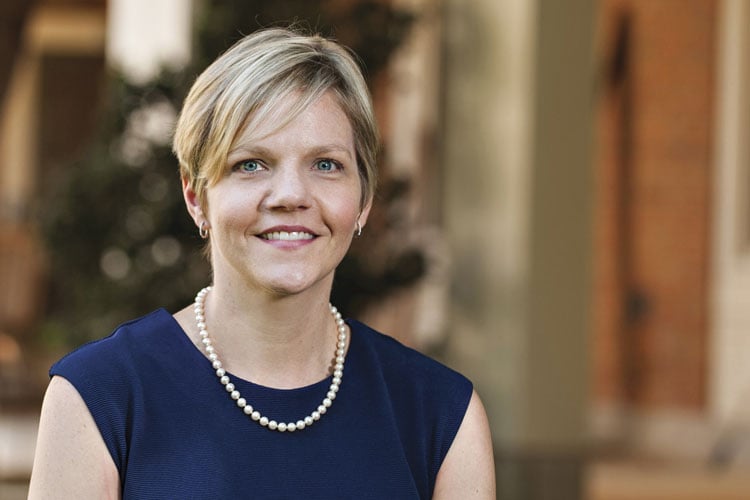Some states now require all attorneys to report wrongful convictions

Lara Bazelon: “Innocence is a rallying cry that crosses political boundaries.” Photo courtesy of the University of San Francisco School of Law.
Wrongful convictions are a double tragedy. An innocent person may rot away in a penal institution, and presumably the guilty culprit gets away with a crime.
Further, wrongful convictions, even in the absence of actual innocence, raise fundamental questions about fairness in the criminal justice system. Whether it’s the pioneering work of the Innocence Project and its exonerations through DNA testing or the popular documentary series Making a Murderer, public awareness and consciousness have increased in recent years.
Prosecuting attorneys are supposed to be ministers of justice and, as a result, have enhanced ethical obligations. The ABA included enhanced duties in its Model Rules of Professional Conduct requiring prosecutors to reveal information about a wrongful conviction. Now, some states are extending this duty beyond prosecutors to all attorneys.
“All of these rules are a manifestation of a raised awareness of the phenomenon of wrongful convictions, which comes from the work of the innocence movement,” says ethics expert Lara Bazelon, an associate professor at the University of San Francisco School of Law. “That there are innumerable people languishing in prison is an irrefutable fact. Innocence is a rallying cry that crosses political boundaries.”
Ellen Murphy, who teaches professional responsibility at Wake Forest University School of Law, says, “There is no question that wrongful convictions are a systemic problem.”
a different take on the rule
The ABA addressed the concern about wrongful convictions in Rule 3.8, Special Responsibilities of a Prosecutor. In 2008, the ABA amended it with Rules 3.8(g) and (h). Rule 3.8(g) says that if a prosecutor possesses “new, credible and material” evidence that creates a “reasonable likelihood” that a person was convicted of a crime they did not commit, the prosecutor must take steps to rectify the situation. The rule requires the prosecutor to disclose the information to the appropriate authority or court, or in some circumstances to the defendant.
Rule 3.8(h) says that “when a prosecutor knows of clear and convincing evidence establishing that a defendant in the prosecutor’s jurisdiction was convicted of an offense that the defendant did not commit, the prosecutor shall seek to remedy the conviction.”
Two states have extended this requirement beyond prosecutors to any attorney who learns of credible evidence that a defendant was convicted of a crime they didn’t commit. Keith Swisher, a legal ethics professor at the University of Arizona’s James E. Rogers College of Law, says that in 2014, Arizona was the first state to adopt such a requirement.
In the Arizona Rules of Professional Conduct, Rule 3.10 says that if an attorney acquires new, credible and material evidence, they “shall promptly disclose that evidence to the court in which the defendant was convicted and to the corresponding prosecutorial authority, and to defendant’s counsel or, if defendant is not represented, the defendant and the indigent defense appointing authority in the jurisdiction.”
In March, the North Carolina Supreme Court approved Rule 8.6 of the North Carolina Rules of Professional Conduct. Similar to Arizona, it extends the obligation to report information about a possible wrongful conviction to all attorneys, not just prosecutors. This rule applies when a lawyer has credible evidence—even if it’s protected by the confidentiality rule, 1.6—that a defendant didn’t commit the offense for which they were convicted.
However, North Carolina has included exceptions to the rule when evidence is “protected from disclosure by law” or court order, when “disclosure would criminally incriminate a current or former client,” or when “disclosure would violate the attorney-client privilege applicable to communications between the lawyer and a current or former client.”
Rule 8.6 arose from a state bar subcommittee investigation into whether North Carolina should adopt the ABA’s rule amendments, Murphy says. “In adopting Rule 3.8(g), the subcommittee determined that the duty to disclose certain evidence about wrongful convictions should extend to all members of the bar, not just prosecutors,” she says.
Civil liberties scholar Erwin Chemerinsky (an ABA Journal contributor) says about the state rules: “I strongly support them and think it is an important step to dealing with the problem of wrongful convictions.”
Although the attempt to rectify wrongful convictions is laudable, Arizona’s Rule 3.10 and North Carolina’s Rule 8.6 contain exceptions that some experts say may swallow the rule.
“Rule 8.6 seems quite narrow,” Murphy says about the North Carolina measure. “For example, while innocence trumps confidentiality, it does not trump the attorney-client privilege. So the question for me is whether the rule, with the exceptions, includes reasonably likely scenarios where a nonprosecutor would learn of a wrongful conviction.”
Bazelon says there’s an issue with the approach of these states’ rules. “The narrowness of the Arizona and North Carolina rules is problematic,” she says. “Both rules talk in terms of those who are innocent of a crime as opposed to those who are wrongfully convicted. In each case, whether someone is actually innocent or wrongfully convicted, and the question of innocence is unclear or unresolved, the issue is the same—the justice system has broken down.”
Ulterior Motives
According to Bruce Green, a legal ethics professor at Fordham University, one reason why Arizona and North Carolina adopted these rules is to appease prosecutors who question why they alone should have enhanced duties when it comes to rectifying wrongful convictions.
“Part of what the prosecutors complain about is the lack of parity,” he says. Some ask: Why should prosecutors have to correct wrongful convictions when defense lawyers don’t? “Of course, there are very good answers to that question, rooted in the different roles and clientele served by prosecutors and defense lawyers. But even so, rules applicable to members of the private bar make it easier for prosecutors to swallow this pill.”
Green points to rules in Alaska and Massachusetts as good examples of ways to avoid the broad confidentiality exception. For example, Massachusetts Rule 1.6(b)(1) says: “A lawyer may reveal confidential information relating to the representation of a client to the extent the lawyer reasonably believes necessary … to prevent the wrongful execution or incarceration of another.”
Experts agree that whatever the motivation, extending rules to disclose evidence of wrongful convictions or actual innocence is a step in the right direction for criminal justice reform.
“I hope that other states will follow suit, but any trend has been slow going,” Swisher says. “The more important rule is the one that applies to prosecutors who learn that they might have convicted an innocent person. Practically speaking, prosecutors have the power and credibility with the court to expedite an innocent person’s release from prison.”

Ellen Murphy: “There is no question that wrongful convictions are a systemic problem.” Photo courtesy of Wake Forest University School of Law.
This article appeared in the September 2017 issue of the ABA Journal with the headline “Innocence Awareness: Some states now require all attorneys to report wrongful convictions.”



